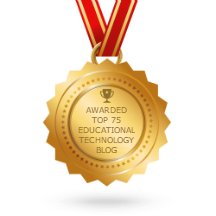This came through my inbox a few days ago and it generated some questions for me (see below).
PRESS RELEASE
July 1, 2013, 3:07 p.m. EDT
K12 Inc. Receives Accreditation Renewal from AdvancED
Industry leader continues to meet the highest standards of education management; receives accreditation renewal for five years
HERNDON, Jul 01, 2013 (GLOBE NEWSWIRE via COMTEX) — via PRWEB – K12 Inc. LRN +3.41% today announced that AdvancED, a global leader in advancing education excellence through accreditation and school improvement, has renewed the education company’s accreditation for five more years.
AdvancED is the world’s largest education community, representing 30,000 public and private school systems across the United States and in 75 countries worldwide and educating 16 million students.
“We are proud that our hard work and commitment to quality, improvement and best practices in digital learning have been validated by AdvancED,” said Allison Cleveland, Executive Vice President of School Services. “The accreditation process is rigorous, and K12 representatives worked tirelessly to examine and report on evidence that demonstrated we are meeting or exceeding AdvancED Standards and Indicators.”
Over the past year, a select group of K12 staff participated in focus groups to examine current practices and gather evidence to present to an external review committee. In April, a team of AdvancED representatives conducted an External Review and had detailed discussions and interviews with corporate and school staff, parents, and teachers. The External Review team visited K12 headquarters, met with leaders from K12-managed online public schools, and observed several online learning environments. The team also attended a corporate-wide broadcast to better understand K12’s commitment to the student and teacher experience.
Dr. Margaret Jorgensen, Chief Academic Officer of K12 Inc., said, “Students are our first priority. We are dedicated to student achievement, the best practices in teaching and instruction, and excellent school services, so that every child has the opportunity to succeed with K12.”
AdvancED accreditation provides reciprocity of credits, courses and grade level placements between schools and universities around the world and validation of the equivalency of diplomas and certificates to other accredited schools and universities. Additionally, accreditation ensures a consistent level of quality in a network of participating schools that is valued by the public and by post-secondary institutions.
The AdvancED Accreditation Process is a protocol embraced around the world and is a comprehensive program of evaluation and external review, supported by research-based standards and dedication to helping schools, districts and education providers continuously improve.
About K12 Inc.
K12 Inc. LRN +3.41% is leading the transformation to individualized learning as the nation’s foremost provider of technology-powered online solutions for students in pre-kindergarten through high school. K12 has worked with more than 2,000 school districts and has delivered more than four million courses over the past decade. K12 provides curricula, academic services, and learning solutions to public schools and districts, traditional classrooms, blended school programs, and families. K12 ‘s curriculum is rooted in decades of research combined with 21st-century technology by cognitive scientists, interactive designers, and teachers. K12 ‘s portfolio of more than 550 unique courses and titles — the most extensive in the technology-based education industry — covers every core subject and four academic levels for high school including Honors and AP. K12 offers credit recovery courses, career-building electives, remediation support, six world languages, and a deep STEM offering. The K12 Program is offered through K12 partner public schools in more than two-thirds of the states and the District of Columbia, and through private schools serving students in all 50 states and 85 countries. More information can be found at http://www.K12.com.
This article was originally distributed on PRWeb. For the original version including any supplementary images or video, visit http://www.prweb.com/releases/2013/K12IncAccreditation/prweb10890144.htm
My questions focus on the process and the standards/metrics that are involved. I’ll be honest and say that I’m not intimately aware of the accreditation process. I know I consulted with one virtual school as an external reviewer of their accreditation application prior to submission. I don’t recall was accreditor they were using off the top of my head. But I’m wondering what metrics or standards or competencies are involved with accrediting a K-12 online learning program.
What gets looked at? What gets measured? How does it get measured?
I recall from the K-12 online learning program I consulted for that they essentially submitted an application that outlined how they met the accreditor’s competencies and the material to support their claims. Two external reviewers selected by the accreditor reviewed the application and materials and gave a decision. The K-12 online learning program had a second opportunity to essentially re-submit their application based on the feedback they received from the reviewers.
There were no site visits. There were no examinations of the K-12 online learning program’s content contained in their learning management system. There was no observations of the online teaching – either asynchronous or synchronous lessons.
This is why I ask… What gets looked at? What gets measured? How does it get measured?

 I’ve been cleaning out my
I’ve been cleaning out my 





 12 Unique Blogs Are Written By Professors
12 Unique Blogs Are Written By Professors